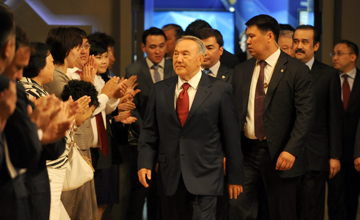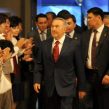
New Cabinet Ministers to Enhance Kazakhstan’s Social Programs
Publication: Eurasia Daily Monitor Volume: 9 Issue: 176
By:

The recent cabinet reshuffle in Kazakhstan clearly reflects President Nursultan Nazarbayev’s emphasis on social and employment programs and economic development, which he outlined in a program article published in July (https://kazworld.info/?p=22739, July 12). Following the departure of Karim Massimov, as the country’s longest serving prime minister, and the appointment of Serik Akhmetov as his successor, Nazarbaev changed only two cabinet ministers—the minister of economy and trade and the minister of labor and social protection. In the aftermath of the December violence in western Kazakhstan, these two ministries have been tasked with implementing critical programs designed to create jobs and ensure economic development in depressed areas and single-industry towns.
Oil-rich western Kazakhstan, which saw prolonged labor disputes and violent outbreaks last year, appears to be high on Nazarbayev’s list of priorities. He named the former governor of Mangistau region Krymbek Kusherbayev as deputy prime minister (Tengrinews.kz; Interfax-Kazakhstan, September 26). Kusherbayev resigned as the head of Mangistau region shortly after clashes between protestors and police in Zhanaozen and Shetpe, which resulted in at least 16 deaths in December 2011. Reportedly, the president stated at the time that the Zhanaozen clashes were not the fault of Kusherbayev (Tengrinews.kz, December 23, 2011). Six months later, Kusherbayev became advisor to Nazarbayev. Despite speculations that the deputy prime ministerial appointment is an award for Kusherbayev’s loyalty to the president, impending social challenges in western Kazakhstan are more likely to justify it.
At the beginning of September, KazMunaiGas Chairman Lazzat Kiinov announced that about 12,200 Kazakh employees would be dismissed from the oil facilities of the North-Caspian project by the end of 2012, the reason being decreased production due to the depletion of oil fields. The downsizing will come a year after 20,000 people were discharged from the Bolashak plant construction project in the Atyrau region after the project was completed. The new massive layoffs would increase the number of low-income families, especially families that rely on one income, as usually is the case in oil producing areas. "In this regard, the issues of increasing the participation of Kazakh producers and service companies in oil and gas projects, and creating new jobs in western Kazakhstan, are of particular importance," Kiinov said (Trend.az, September 3).
Countering the social effects of decreases in oil production and creating opportunities for alternative industries will be the main task of two new ministers appointed by Nazarbayev: the Minister of Economic Development and Trade Yerbolat Dossayev, 42, and the Minister of Labor and Social Protection Serik Abdenov, 35, one of the youngest ministers in Kazakhstan’s history (Tengrinews.kz, September 26). Both represent the country’s new generation of public servants, who started their professional career after the country gained independence.
The new Minister of Labor and Social Protection Serik Abdenov, will have to tackle another crucially important and sensitive problem—the growing number of labor disputes and how to resolve them while respecting workers’ rights. A report by Human Rights Watch, released earlier in September, criticized three oil companies and the Kazakh authorities for mishandling the 2011 labor disputes that led to the Zhanoazen events. The companies named in the report are: Karazhanbasmunay JSC, a joint-venture between Kazakhstan’s state oil and gas company, KazMunaiGas Exploration and Production (KMG EP), and China’s state-owned CITIC group; Ersai Caspian Contractor LLC, an oil service company partially-owned by Italy’s Saipem S.p.A; and OzenMunayGas, a subsidiary of KMG EP (hrw.org, September 10).
KazMunaiGas responded in a press release that the “Human Rights Watch report was prepared without regard to the employer’s standpoint and therefore it appears somewhat one-sided" (Interfax-Kazakhstan, September 17). The government also said that a number of measures to address labor disputes after the Zhanaozen events were not mentioned in the report, including the fact that 2,000 oil workers, who were fired for participating in the strike in 2011, were re-hired just weeks after the Zhanaozen clashes (AlJazeera, September 12). Nonetheless, the report offers some valuable recommendations and outlines international labor law standards, which could be helpful in improving Kazakhstan’s labor legislation, company practices, and government oversight. The report, however, does not reflect the government’s own recognition of the problems and the way subsequent labor disputes were handled as a result of lessons learned from Zhanaozen.
“Labor conflicts are on the rise at several enterprises,” stated Kazakhstan’s State Secretary Mukhtar Kul-Mukhammed at a panel meeting hosted by the ministry of labor and social protection in Astana in July 23. He pointed out the prospects for labor conflicts at the Altynai Kokshetau gold mining enterprise in the Akmola region, saying that more than 900 workers were disgruntled with their pay at the Shantobe mine, and workers were holding regular warning strikes at ArcelorMittal Temirtau JSC in the Karaganda region.
“There is a lack of communication between employees and employers. Regional labor departments do not always work closely enough with enterprises,” concluded Kul-Mukhamed. The then Minister of Labor and Social Protection Gulshara Abdykalikova informed that a state commission had approved a plan to prevent social tensions and resolve labor conflicts, which would be enacted shortly. Since January, almost 100,000 workers have signed up for the ministry’s new employment program (Interfax-Kazakhstan, July 23).
Earlier in July, President Nazarbayev called for measures to hold responsible employers, officials, and instigators for intentionally provoking labor conflicts, including late payment of workers’ wages and failure to comply with collective agreements. “Creating efficient patterns of social and labor relations is at the top of the social modernization agenda,” he announced before outlining his social program later in the summer. In his article “Twenty Steps toward a Universal Labor Society,” the president expressed dissatisfaction with the pace and quality of applying the social and economic policy outlined in his January 2012 annual address to the nation. Nazarbayev wrote: “Social issues cannot be postponed until later.” He tasked the government to propose by mid-2013 legislation and other measures in the social sphere, including resolving labor disputes, trade union development, supporting the middle class, countering unemployment, and providing social protection for the youth. The newly appointed key ministers in charge of the economic and social portfolios will be the point persons in this effort.




